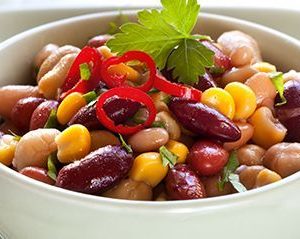- Could Your Grocery Store Meat Be Causing Recurring UTIs?
- Are You Making This Expensive Thermostat Error This Winter?
- Recognizing the Signs of Hypothyroidism
- 10 Strategies to Overcome Insomnia
- Could Artificial Sweeteners Be Aging the Brain Faster?
- Techniques for Soothing Your Nervous System
- Does the Water in Your House Smell Funny? Here’s Why
- Can a Daily Dose of Apple Cider Vinegar Actually Aid Weight Loss?
- 6 Health Beverages That Can Actually Spike Your Blood Sugar
- Treatment Options for Social Anxiety Disorder
Dine Your Way to Lower Cancer Risk

Having the information to make good food choices and being physically active can help prevent disease, including cancer.
The Academy of Nutrition and Dietetics offers some tips for Americans who want to improve their nutrition.
“Fruits, vegetables and whole grains provide you with nutrients and dietary fiber that can help lower your risk of developing cancer in the long term,” said Amy Bragagnini. She is a registered dietitian nutritionist and oncology nutrition specialist who serves as national spokeswoman for the Academy of Nutrition and Dietetics.
“Eating a variety of foods from all food groups keeps your meals interesting and healthful. Fresh, frozen, canned or dried fruits and vegetables all make your meal preparations easy,” Bragagnini said.
She recommends filling half of your plate with fruits and veggies at each meal.
“Add fresh berries to your low-fat or fat-free yogurt in the morning. Eat a dark green leafy kale salad for lunch. Stir fry some spinach, broccoli and cabbage to add atop a bed of riced cauliflower for dinner,” Bragagnini suggested.
Getting in more legumes — such as beans, peas and lentils — can also add nutrition. She suggests adding black beans to an omelet and using a carrot stick as an edible spoon with hummus for a snack. A big pot of chili or lentil soup can be a healthy dinner.
Making sure whole grains are also in meals is important. This can include a warm bowl of oatmeal with dried fruit for breakfast, a whole grain barley bowl with baked chicken for lunch and a whole wheat roll with dinner.
While making all these additions, there are some foods that it’s better to subtract. Bragagnini suggests replacing red and processed meats with a tuna salad at lunch time, a grilled chicken breast at dinner or having a meatless meal, such as a whole wheat pasta primavera.
Also limit the amounts of added sugars and saturated fat, information that can be found on a packaged food’s label.
A registered dietitian nutritionist can help you develop a nutrition and physical activity plan that meets your health goals, now and throughout life, she said.
More information
The U.S. Office of Disease Prevention and Health Promotion offers dietary guidelines for Americans.
SOURCE: Academy of Nutrition and Dietetics, news release
Source: HealthDay
Copyright © 2026 HealthDay. All rights reserved.










